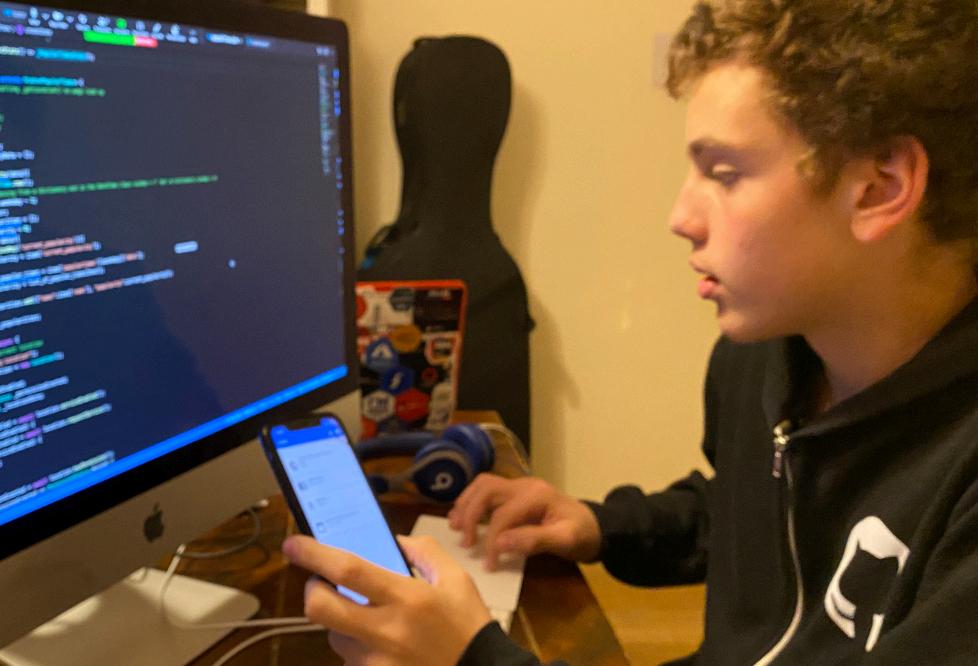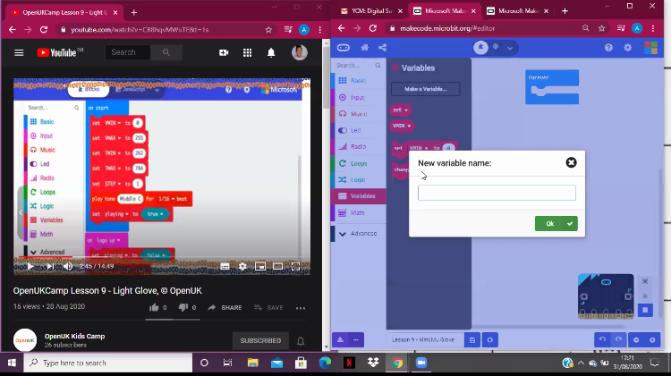
10 minute read
FAILURE IN THE TIME OF LOCKDOWN
By Femi Owolade-Coombes | A.K.A. Hackerfemo (aged 14) Co-Founder Young Coders MeetUp | United Kingdom
All too often when we post on Social Media or write blogs we only talk about our successes and the amazing things we experience but it is just as important to talk about the not so positive aspects too.
“The greatest teacher, failure is.”Jedi Master Yoda
In this article I want to write about some of the failures I’ve had over the lockdown period. This is partly to be more real about the ups and downs when working on projects and coding but also to reveal what valuable things I’ve learnt from them.
Let’s start with “Lockdown has been a bit of a nightmare!”
I know it has had a massive impact on people all around the world and I am lucky to be safe and well. However, so many awesome trips, activities and events that I was looking forward to were all cancelled in the space of a week. I’m an avid field hockey player - practicing 6-7 days a week which just instantly stopped. My team missed out on hockey nationals and the team tour to South Africa was cancelled. I had just managed to arrange a meeting with a leading professor in the field of Computer Vision - Professor Bowden, from the University of Surrey to discuss the Sign2Word AI app I’ve been working on with Imran, one of our Deaf coders, but I wasn’t able to follow though. I also missed out on an amazing trip to Maritime Canada (making up the provinces of New Brunswick, Prince Edward Island & Nova Scoita) with Brilliant Labs hoping to reach out and maybe set up a Canadian Young Coders MeetUp chapter - during the May half term.
It wasn’t all doom and gloom though. I actually found remote schooling really handy because I could finish my work a lot more quickly, focus on my coding projects, and still manage to get good end of year grades. In fact, just before the lockdown the Young Coders MeetUp (YCM) managed to run a 2 day event at the Tate Modern (Tate Modern is an institution that houses, in a network of four art museums, the United Kingdom's national collection of British art, and international modern and contemporary art. It is not a government institution, but its main sponsor is the UK Department for Digital, Culture, Media and Sport), exploring Machine Learning and celebrating Women in Tech for International Women’s Day. Looking back we are really glad we did it as it was the last time we all met up socially before the lockdown (https:// youngcodersmeetup.wixsite.com/ ycm-uk/post/young-coders-curateai-event-tate-modern).
FAILURES
My first failure was the TeensInAI #YouthVsCOVID hackathon. Here I was part of one of three groups from our YCM that entered this competition. My group comprised of three other members: Thomas - back end developer, Adonai and Amelie who worked on design, market research and developed the website. I was the team leader and just covered all the areas, but mainly worked on front-end, AI components, surveys and user feedback. We came up with an AI app called CoWA (Coronavirus Wellbeing App - https:// youngcodersmeetup3.wixsite.com/ cowa) which aimed to help young people manage their physical and emotional wellbeing during lockdown using an integrated AI sentiment analysis feedback loop. Long story short, we failed to get in the top three, which to me was incredibly disappointing; three solid hackathon intensive weeks for nothing. I was not happy and to be honest I felt cheated - not necessarily true, but that's how you feel in that moment.
The second failure came a month later, in June, after 6 months of working on a submission, based on
PHOTOS SUBMITTED: TATE-MODERN YCM EVENT


PHOTO SUBMITTED: AMELIE, FEMI, ADONAI,, THOMAS OF YCM, TEENSINAI #YOUTHVSCOVID HACKATHON.


PHOTO SUBMITTED: ADONAI, YCM, RUNNING SESSION

an app that I’ve been working on with one of our Deaf coders, Imran, (we want to show that the idea came from a Deaf person) - the
Sign2Word AI app (https:// youngcodersmeetup3.wixsite.com/ website). The app aims to help young deaf learners improve their literacy skills and have a better experience in education. The user will be able to sign a word into their mobile camera and the app would translate it into written English. A team of 5 YCMers joined up to submit the idea to the Nesta
Longitude Explorer prize. Nisha,
Mutsa, Thomas and Malakia formed the team with us. Imran had to remain as our Product client as he was just over the age limit for the competition. This time we failed to even make the top 5 - to add insult to injury, there was a cash prize of The Sign2Word AI app aims to help young Deaf learners improve their literacy skills and have a better experience in education. The user can sign a word and the app will translate it into written English.

£25,000. You can imagine the indescribable failure I felt on this second one. I decided never to enter a competition ever, ever again.
Now I’ve got the shame bit out of the way, let's talk about what I learnt because that actually far outweighs those negative experiences. And I am now a lot further along the journey to getting our Sign2Word app developed in a way that will benefit the Deaf community.
Lessons Learnt
Of course, all that effort hasn’t gone to waste. Firstly, the hackathon exposed me to some amazing AI speakers including Alejandro Saucedo (https://

www.youtube.com/watch?v=TPoEsHJE6U), Gretchen Greene (https:// www.youtube.com/ watch?v=v09jG_ar2NI) and Dr Allison Gardner (https:// www.youtube.com/ watch?v=Knva2te938E). Their talks were really enjoyable and informative, with a particular focus on ethics: Alejandro Saucedo talked about the Institute for Ethical AI’s ‘Eight Ethical Principles’ for all AI technology; Gretchen Greene focused in on the importance of transparency when collecting data and the dangers of a surveillance state; Dr Allison Gardener reinforced the significance of developing privacy by design apps, ensuring data is stored in decentralised locations, so users are able to give informed and meaningful consent

https://youngcodersmeetup3.wixsite.com/website

and you only store necessary data.

The hackathon also introduced me to the key elements of Human Centred Design for developing apps which incorporate Design Thinking and Business Models. Design Thinking is a process where you start with an idea, develop a prototype and continually improve the product based on feedback from users. For us, this meant sending out surveys, receiving feedback on a wireframe demo and consulting with our user communities. In terms of the Sign2Word app, it meant consulting with the Deaf community. It was the most important stage of development so far and involved incorporating British Sign Language into the surveys. The feedback helped to ensure that our app would be properly accessible. Importantly, the design of the app needs to be led by young Deaf students for whom it is designed. We got lots of encouragement from the Deaf community and National organisations who support the Deaf children. As a result, we hope to run some coding and AI sessions for the Deaf students at Imran’s former school so they can contribute to the development of the app and come up with their own Tech4Good ideas. We also want to set up a diverse and representative dataset of British Sign language words for Machine Learning.
Over the course of the lockdown I really developed as a coder, learning how to build apps in Swift, Flutter and React Native, and how to incorporate AI features into them. I also learned a valuable lesson about source control (backing up your code online). Just before the final submission of the #YouthVsCOVID hackathon my code didn’t work, but because I’d backed it up to GitHub, all I had to do was restore my previous version of code and I was saved. I deepened my understanding around Artificial Intelligence and Machine Learning, following numerous tutorials, exploring Google’s Teachable Machine and delving into Tensorflow and PyTorch. A lot of this learning was facilitated by the brilliant mentors that supported us in the #YouthVsCOVID hackathon and the Nesta Longitude Explorer Prize.
Another thing I learned was that it is challenging to be a team leader/ project manager; it’s really hard work. We had lots of pivot points during the design thinking process but communicating them to everyone and ensuring we were all on the same page, was far from easy. I had a very high level of commitment and ambition, but expecting that, continuously, from every member of the team was unrealistic, especially if over several months.
Our YCM is big on gender equality but half way through the Nesta competition we had to re-evaluate our roles in the team, to really make sure that the female team members were equally involved in the coding. I was doing most of the AI and React Native work so this required me to take a step back and hand over the front end development role to them. Although this was quite hard for me to do at first, it was ultimately rewarding and opened up a conversation within the YCM community on how we can challenge these gender stereotypes in the tech industry. Everyone needs opportunities to build up their coding skills - it makes for a more rounded team.
Reflection
experience failures as you are developing skills and knowledge in relation to tech. It helps you realise what's missing and what the gaps in your knowledge are. Then, if you take failure as a lesson there are so many things you can learn from it. When you are part of a team and you fail to win competitions or achieve the results that you set for yourself, it's really nice to be able to learn how to manage disappointment together and know that it’s ok because that's how you build resilience. The lockdown gave us the opportunity to think a bit differently, like engaging via virtual platforms at a global level, and it pushed us to ideate and come up with ideas, but then follow through the whole Design Thinking process all the way through to pitching our idea to a panel of judges. It’s something we will never forget - when we think about covid 19 and the lockdown we will always think of those virtual meetups, hackathons and the intensity of the competitions with a smile on our face. Already, Adonai has run a digital summer camp for younger YCMers over August and has received some fantastic feedback. We are happy that there were a lot of Black and Ethnic Minorities (BME) participants -doing our part for the #BlackLivesMatters campaign. We also ran virtual YCM coding tracks on a Friday evening for our more advanced YCM members on React Native and Javascript, which also went really well. We have a much deeper understanding of AI and how it can be incorporated into Tech4Good apps and we’ve grown closer, working in teams, and look forward to running some more Young Coders Meetups in the new year. Hopefully we can collaborate with Brilliant Labs so we can reach out to young coders in Canada in the new
Host a YCM & Create an International Connection




Brilliant Labs is looking for intersted schools or community partners to initiate and host YCM groups here at home. Participating youth would work together to solve challenges using ICT and collaborate with other YCM chapters, nationally or internationally with the UK chapters. Youth will reguarly troubleshoot and share findings. If you are intersted in hosting a YCM at your school or community centre please contact us: info@brilliantlabs.ca | Subject: YCM

FOLLOW & LEARN MORE ABOUT YCM UK
Twitter: @YCM_UK |@hackerfemo Websites: https://hackerfemo.com youngcodersmeetup.wixsite.com/ycm-uk
Brilliant Labs Magazine Revue Labos Créatifs











